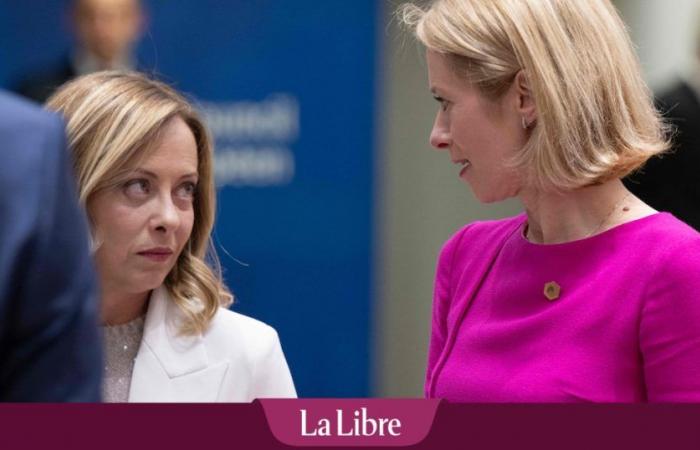A deal express on the distribution of top European jobs seemed more than ever within the reach of the heads of state and government of the Twenty-seven, meeting this Monday in Brussels. But there are traditions with which we do not break. Including that of a great political bargaining, where each country and political camp tests the limits of the others, to pull the cover a little closer towards itself. Result : “It was a good conversation. But there was no agreement this evening”announced Charles Michel, President of the European Council, around midnight.
Considered as a first discussion, this informal European summit risked ending more quickly than expected, with the announcement of a consensus around the future European “dream team”, for the positions of president (or rather president) of the Commission , the head (or head) of Union diplomacy and the person who will replace Charles Michel at the end of the year. The favorite candidates are respectively the German Ursula von der Leyen, who has already led the European executive since 2019 and comes from the European People’s Party (EPP), the liberal Estonian Prime Minister Kaja Kallas and the former head of the Portuguese government, the socialist Antonio Costa. A configuration which would respect the outcome of the European elections – the EPP emerged as the big winner – but also the geographical balance, between the North, the South and the East of Europe. Packed, it’s weighed. “It seems so obvious that they would rather have gone to negotiate the vice-presidents of the Commission”, said a diplomatic source in the afternoon.
Doubts about Antonio Costa?
Some leaders have nevertheless decided to infuse suspense into this debate. Polish Prime Minister Donald Tusk hit the nail on the head for Antonio Costa. “He has skills. But we need to clarify the legal context, you know what I’m talking about”, he said, on the sidelines of a meeting Monday afternoon with his EPP peers. The Portuguese resigned in November, after the launch of a corruption investigation involving his close collaborators. If Mr. Costa is no longer in the sights of investigators, the matter is still up in the air. Furthermore, as a defender of the rule of law, as opposed to his Eurosceptic adversaries from the PiS who ruled Poland for 8 years, Mr. Tusk undoubtedly had to say something. To see if it was only for form. Or to obtain the promise of a good job for the future Polish commissioner, in exchange for his support for Mr. Costa.
Or to serve the agenda of the EPP which, on the strength of its victory in the European elections, would also like to offer itself a share – namely a half-term of 2.5 years – of the presidency of the European Council. This new ambition of the EPP undoubtedly goes down very badly with the Socialists and Democrats, who remain the second largest group in the European Parliament and do not intend to let it happen.. “Or the EPP gives them 2.5 at the head of the Commission”, ironically launched a European source. “Political parties play a role. They made proposals and we need to work on them”Mr. Michel simply clarified at the end of the summit.
The brake could also come from Italy. Prime Minister Giorgia Meloni, who has so far kept her cards close to her chest, would be upset not to see any important post go to her country or to her political family of European Conservatives and Reformists (ECR). This group has gained seats in the European Parliament, thanks in particular to the success of Ms Meloni’s post-fascist Fratelli d’Italia party, and could rally more members, including Hungarian Viktor Orban’s Fidesz. So much so that the ECR could take third place in terms of size from the liberals of Renew Europe… Except that they would still form, with the EPP and the S&D, the informal center majority, known as the “von der Leyen majority” , on which the next Commission and legislature must be based. That doesn’t do Ms. Meloni’s business.
On Monday, his Minister of Foreign Affairs Antonio Tajani – a member of the EPP – noted in any case that the choice of Mr. Costa arouses “perplexities”, some fearing that it “not be firm enough on the Ukraine issue”. And to mention “at random” as another option, Enrico Letta, former Italian social-democrat Prime Minister, who was once a member of the EPP…
Be careful not to be too pro-Ukrainian, says Slovakia
For his part, Slovak President Peter Pellegrini estimated that European leaders “[doivent] be very careful about who will represent the EU and the Commission at international level, so as not to create more tensions. We need someone who can calm the situation”. First clue to understand: Mr. Pellegrini is very close to the pro-Russian Slovak Prime Minister Robert Fico, whom he replaced at the European summit this Monday, while the latter is convalescing after having suffered an assassination attempt. Second clue: Kaja Kallas is known for her tough tone towards Moscow and her strong support for Ukraine. In short, you understand: the Slovak is not a big fan of the latter. Would he go so far as to directly oppose his appointment to the post of High Representative? Or did Mr. Pellegrini just want to show off, even though he was sworn in just two days ago?
In any case, a little reminder is in order for those who might be tempted to play spoilsport. If European decency dictates that the distribution of top jobs be regulated by consensus, the treaties also give the possibility of voting, by qualified majority (minimum 15 Member States, representing 65% of the European population. Hungary and the United Kingdom had the bitter experience of this in 2014, when they opposed in vain the appointment of Jean-Claude Juncker as head of the Commission.
Speaking of this post, no one has really called the bluff on this topic at this point. There is “an emerging consensus” around Ursula von der Leyen, noted the Taoiseach Irish Simon Harris. “She does an incredible job”said Mark Rutte, outgoing Dutch Prime Minister – and well on his way to becoming NATO Secretary General. “She is a very good President of the Commission”added Greek Prime Minister Kyriakos Mitsotakis, even though he is considered plan B for the presidency of the Commission.
The distribution of major positions will therefore be at the heart of the agenda of the European summit on June 27 and 28, where a final agreement is expected.






